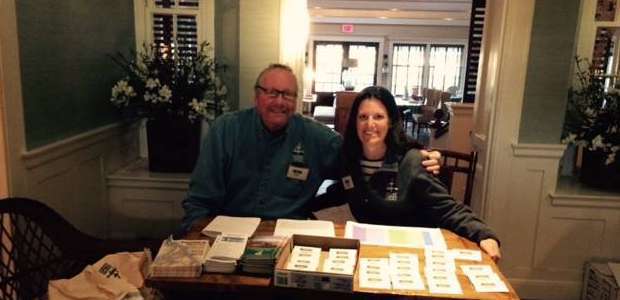Sarah T. Bois
Editor’s Note: The following article appeared in the online Nantucket Chronicle on February 4, 2016, and is reprinted here with permission.

Vern and Sarah at the LLNF Birding Festival in 2015
With the recent passing of Vernon Laux, I’ve been thinking a lot about his absence and what that means to me, the Linda Loring Nature Foundation, the birding world, the Nantucket community, and the children he’s inspired and educated. Rather than try to sum up all of these aspects of Vern, some of which I can only scratch the surface of, I’ve decided to write a more personal remembrance. So, though Vern is known globally for his powers of observation, tenacity, and expertise in the world of birding, I’m going to speak about Vern Laux, my friend and co-worker.
Here are five lessons learned from Vern Laux:
It could always be something special. Never dismiss a group of birds as anything common. Look closely enough and the rare and special may be hidden among the flock. One early summer day, my husband came by our office to have lunch. Vern, Carl, and I sat at the picture window eating sandwiches and chatting about fishing. A slew of mourning doves huddled around the bird feeders. Nothing extraordinary. Then Vern interrupted Carl mid-sentence to exclaim that one of the mourning doves was actually a white-winged dove, a bird usually found in the far southern US and Central America. Leave it to Vern to spot the rarity.
Don’t talk down to kids. Despite not having any formal training in education, Vern was an intuitive teacher. His enthusiasm for nature and all things birding was infectious. Children were drawn to him, which I believe was due, in no small part, to the way he spoke to them. He never talked down to children, but spoke to them as peers regardless of their age. He would tell hysterical stories with the heart of a six-year-old all the while discussing breeding habits of Osprey. It is a testament to his genuineness that many island children called Vern their friend.
A true story can be improved upon in the retelling. Working with Vern I got to hear many of his stories; some of which I heard more than once. He was an engaging storyteller leading the listener along right to the end. That’s one thing that made him so great to listen to on the radio. However, sometimes the story changed just a bit, was just a bit funnier, or more harrowing. Who knows which versions were true and does it really matter? Aren’t we all a little better off for having heard a great tale?
Live life to the fullest. Vern was one to fully enjoy life; never pass up a cookie or a drink when offered. I don’t think he ever met a trip he wouldn’t take. He knew how to have a good time and not take life too seriously. When I first started at the Linda Loring Nature Foundation he took me out birding with him. After driving around town we stopped in front of a non-descript house with a small front yard and several feeders. “Wait, what’s in there?” he said aloud. There was excitement in his voice, so I knew it was going to be good. As I looked with my binocs, he guided me to the bird atop the feeder, head down. “It’s an Ivory-billed Woodpecker!” he exclaimed with glee. Sure enough, I was looking at a wooden carving of an extinct bird. How many others has he pulled into this trap? I can hear his big laugh even now just thinking about it.
Keep your eyes to the sky. This signature statement ended the WCAI Bird Report each week. Taken literally, Vern loved to remind us that we would only see more and interesting birds the more we looked. Now, with Vern gone, I am reminded to keep my eyes open to observe the world around and all it has to offer. Live big, love big, laugh big. Keep your eyes open to the possibilities.
Vern wouldn’t want you to miss a thing.